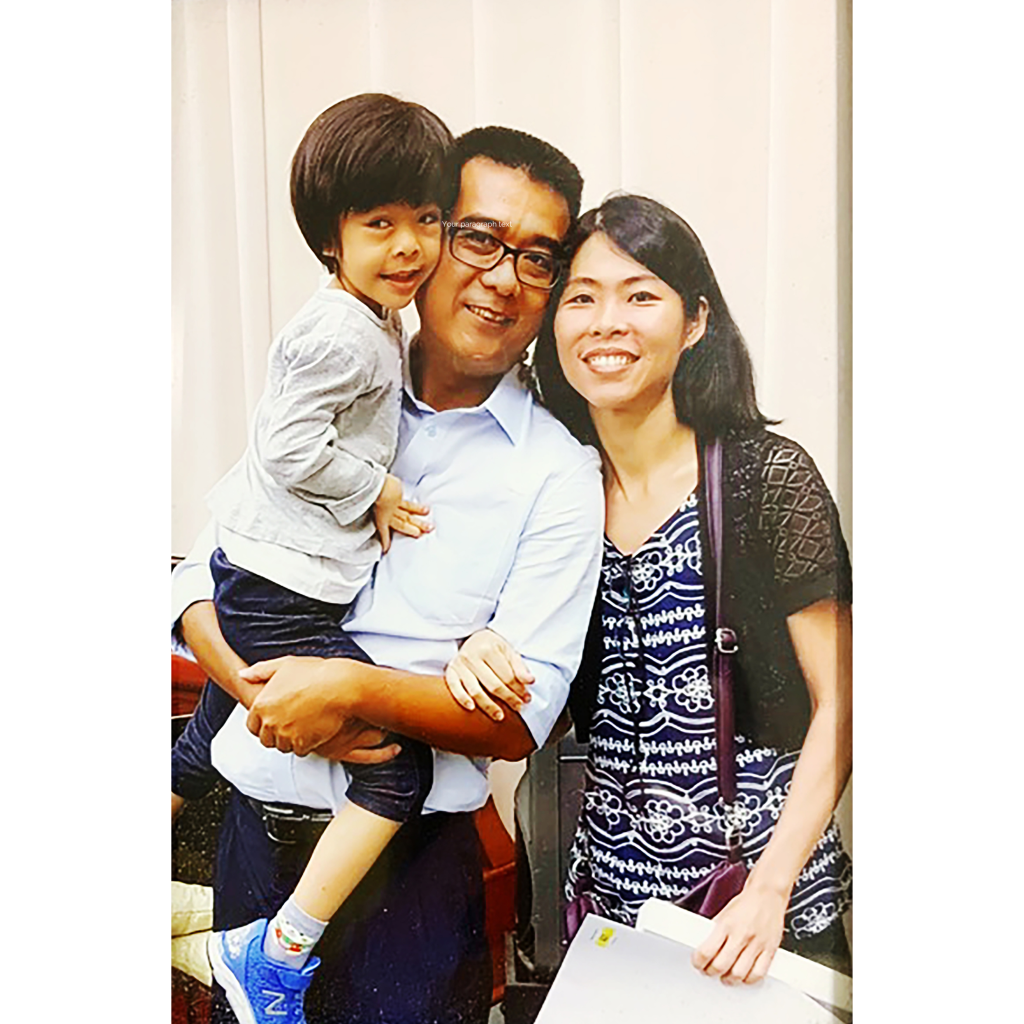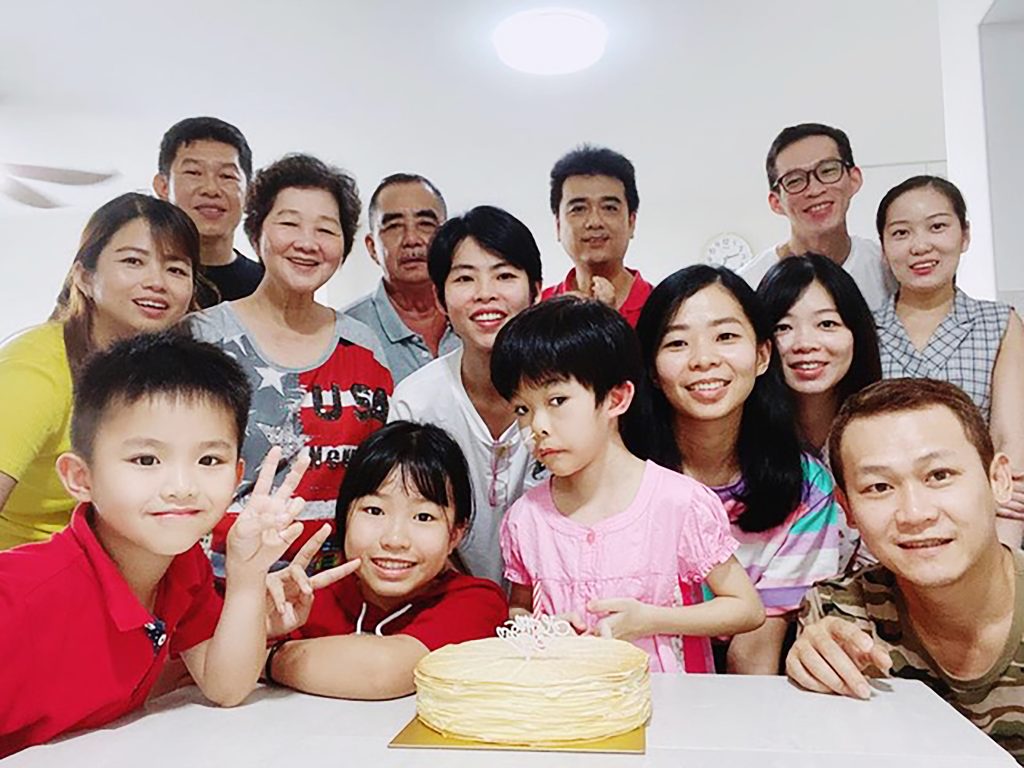
on April 16, 2017.
Teh Woan Ling
Women Division
The Covid-19 pandemic in the past two to three years has impacted many people’s lives. It poses an even greater challenge to families of children with special needs. I am very fortunate to have encountered Nichiren Buddhism and joined the Soka Gakkai family nine years ago. This has empowered me to overcome this difficult period courageously.
My daughter, Guang Hui, was born on New Year’s Day. Her birth in 2012 brought great joy to our family. When she was one year old, I noticed that her development was different from other children and the doctor wasn’t able to give a diagnosis for her situation. I was in agony and filled with worries about her future. Just as I was beginning to feel helpless, I had the good fortune to be introduced to Nichiren Buddhism by another patient’s family member in the hospital. I then began to chant.
Chanting Ceaselessly with Unwavering Determination
We were Malaysians. My husband came to Singapore alone in 2015 to work while my daughter and I remained in Malaysia. It was challenging for a family to be separated. Hence, I brought three-year-old Guang Hui to reunite with my husband in Singapore in the same year. We successfully rented a HDB flat in Sembawang, which made it more convenient for my husband to travel to work and me to bring Guang Hui to a public hospital for medical reviews.
When we were in Malaysia, the doctors couldn’t find the cause of Guang Hui’s condition. Basing myself on Ikeda Sensei’s guidance, I chanted earnestly and actualised the Buddhist philosophy, hoping that it would help Guang Hui. Ikeda Sensei says, “The power of our inner determination is immeasurable, and its ultimate expression is unshakeable and courageous faith in the Mystic Law. The sound of our voices resolutely chanting Nam-myoho-renge-kyo reverberates throughout the entire universe, turning everything into a positive force that will support and protect us. When you hit a wall, chant daimoku. When things are not going as hoped, pray with even greater resolve until you win through. Chanting Nam-myoho-renge-kyo bravely and vigorously enables us to bring forth the wisdom to surmount adversity and move things dynamically towards fresh victories.” (From Advancing with the Gosho: Words of Encouragement from President Ikeda )
Not long after, Guang Hui was diagnosed with a rare congenital condition, Coffin-Siris Syndrome, which is a rare autosomal dominant genetic disorder. According to the doctors, Guang Hui is the first of such cases diagnosed in Singapore. Coffin- Siris Syndrome affects several body systems. Symptoms include visual and hearing abnormalities, diminished muscle tone, coarse facial appearance such as wide nose with a flat nasal bridge, abnormally large distance between the eyes, thick eyebrows and eyelashes, and developmental delays.
I diligently practised Buddhism daily, with the determination to transform our karma into mission. The same year, I received my Gohonzon and my husband became a member of the Men Division’s King Castle Group (Ojokai). Just as we were adapting to the new rhythm of life, Guang Hui was diagnosed with another disorder the following year. It was also a rare disorder called Cyclic Vomiting Syndrome. She will vomit after ingesting food, and the episodes can last from a few hours to several days.
In 2018, between January and May, Guang Hui was admitted to KK Women’s and Children’s Hospital for a total of six times. She was then transferred to the National University Hospital in May, during which, she was admitted three times. At that time, I was under a lot of stress and feeling depressed. It was with the encouragement and support of the leaders that I could continue striving based on faith again. Besides chanting for Guang Hui’s health, I also chanted that my family could contribute to Singapore’s Kosen-rufu movement together. I continued to chant abundant daimoku, actively introduce others to Nichiren Buddhism, and participate in Soka Gakkai activities as well as gongyo sessions on Sunday mornings.
I determined that regardless of the situation, I would not give up and would continue to chant. Gradually, I noticed that Guang Hui’s condition started to improve, and she made better progress compared to the other patients with similar condition. Patients with such illness will usually vomit at least 50 times, but for Guang Hui, it was less than 30 times. This demonstrated the Buddhist principle of lessening one’s karmic retribution.
As Guang Hui was underweight and suffering from malnutrition, she required nasogastric tube feeding. When her tube dislodged accidentally at home one day, we asked the doctor if she could eat by mouth. The doctor said yes. We were overwhelmed with joy, and this was another actual proof for me.
Joy of Sharing Buddhism and Having Victorious Actual Proofs
In 2019, Guang Hui’s Cyclic Vomiting Syndrome had a relapse, and she was in and out of the hospital again from May till November. However, her condition was less severe than a year ago. As I have witnessed the actual proof of faith from my daughter’s example, my conviction in the Gohonzon has deepened. Besides that, I witnessed changes in myself. I have always been a pessimistic person. However, when I saw the worried looks on other mothers in the hospital, I mustered my courage to initiate dialogues and shared Guang Hui’s experience with them. I was determined to share with more people the greatness of Nichiren Buddhism and the Mystic Law. Regardless of whether they would take up faith eventually, I have at least planted the seeds of Buddhahood and happiness in their lives. At times, I would help some of the patients make purchases or introduce them to organisations with resources that might be useful for them. The joy of seeing those I have shared Buddhism with becoming happy is indescribable.

My husband’s initial plan was for Guang Hui and me to return to Malaysia when her condition improves if we were not granted the Singapore citizenship while he continues to work in Singapore. I have heard from many friends that despite having worked and lived in Singapore for a long time, they could not secure a Singapore citizenship. Nonetheless, I continued to chant abundant daimoku daily with the prayer that our family can stay in Singapore and contribute to the kosen-rufu movement here. I chanted with the strong determination that I must be victorious!
Finally, our family was successfully granted Singapore citizenship in July 2018. My prayer was answered again! Furthermore, in October the following year, we moved into a new home. Our current HDB flat in Canberra was also a result of our prayers! I am grateful to have encountered Nichiren Buddhism and to have so many wonderful comrades in faith who chanted for us and gave us encouragement. I would also like to thank my husband for helping to take care of Guang Hui so that I can attend Soka Gakkai activities. Above all, I would like to thank my daughter, Guang Hui, for giving me the opportunity to encounter Nichiren Buddhism, which has enabled me to become a strong Women Division member who has the courage to face obstacles and overcome challenges.
In The New Human Revolution Volume 24, “Ode to Mothers” chapter, Ikeda Sensei wrote, “Some children are born with incurable illnesses. It’s a difficult, heartbreaking situation for any parent to face this kind of karma. But everyone possesses the noble life state of Buddhahood and is born with a valuable mission… Encountering the Mystic Law in this existence dramatically opens the way to transforming our karma. In a way, it could be said that such children were born with the mission to awaken their parents and other family members.”
Brimming with hope towards the 100th anniversary of the Soka Gakkai’s founding in 2030, I am determined to walk the path of kosen-rufu together with my mentor, Ikeda Sensei. I will strive to share Buddhism with more people and foster Guang Hui to become a capable successor for kosen-rufu!
(Adapted from April 2022 issue of Creative Life)
